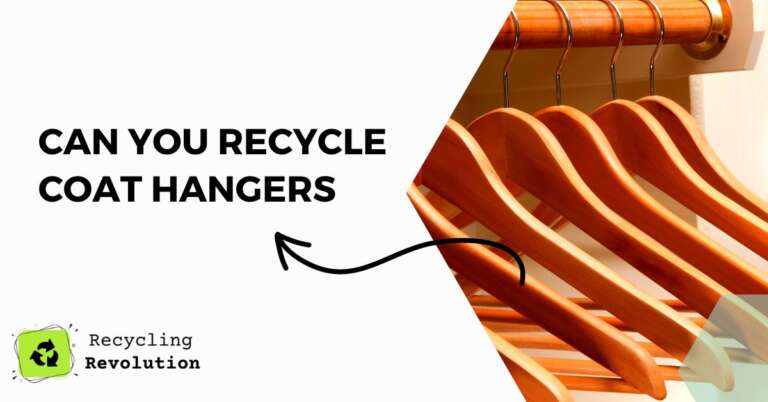When it comes to recycling, one item that often leaves people scratching their heads is the humble coat hanger. With millions of hangers produced and discarded annually, understanding the proper disposal method can make a significant environmental difference. As an authority on the topic, I’ve dived deep into the subject to offer some clarity. So, let’s unravel the mystery!
tl;dr: Not all coat hangers are recyclable in the same way. Material type and local recycling facilities play a significant role in determining whether your hanger can be recycled. It’s essential to check local regulations and consider reusing or repurposing first.
The Different Types of Coat Hangers
Coat hangers are not one-size-fits-all when it comes to recycling. Their recyclability largely depends on their material.
Metal Hangers
Most commonly found at dry cleaners, these thin, wire hangers might seem easily recyclable. However, their shape and size can cause problems in recycling machinery.
While the metal is recyclable, many curbside programs won’t accept them. I recommend taking them back to the dry cleaner, as many establishments are happy to reuse them.
Plastic Hangers
While plastic is recyclable, the types of plastic used in hangers aren’t always accepted at local facilities. They often contain mixed materials that can’t be processed with standard plastic recycling machinery. Always check with your local facility before tossing them in the recycle bin.
Wooden Hangers
These are usually not recyclable due to the finishes and glues used. However, they are prime candidates for repurposing or donation.
Why Recycling Matters
To emphasize its importance, a study by the Environmental Protection Agency (EPA) showed that recycling reduced more than 186 million metric tons of carbon dioxide in 2019, equivalent to the emissions from over 39 million cars. Considering the volume of coat hangers produced, recycling them properly can contribute to this reduction.
Reuse and Repurpose: An Eco-Friendly Solution
Before diving into the recycling bin, I recommend considering these options:
Donation
Many organizations, thrift stores, and shelters are often in need of hangers. By donating, you’re not only reducing waste but also helping your community.
Crafts and DIY
Unleash your creativity! Hangers can be transformed into numerous DIY projects. From garden trellises to jewelry organizers, the possibilities are endless.
Swap with Friends
Hosting a clothing swap? Why not include hangers in the mix!
What the Experts Say
Scientific research highlights the need for improved recycling methodologies. A study by the Journal of Waste Management found that efficient recycling could reduce the environmental impact of plastic products by up to 60%. This emphasizes the importance of correctly recycling items, including coat hangers.
Community Initiatives
Some communities have set up special coat hanger recycling programs, understanding their potential impact on the environment. These programs ensure hangers are properly processed and recycled, diverting them from landfills.
The Environmental Impact of Not Recycling Coat Hangers
In our throw-away culture, the cumulative effect of not recycling items as seemingly inconsequential as coat hangers can have a significant environmental footprint.
Landfill Overload
It’s estimated that billions of hangers end up in landfills annually. Given their lifespan—plastic hangers can take hundreds of years to degrade, releasing toxins into the soil and water—this is a concerning statistic. Landfills are already under pressure with increasing waste volumes, and every hanger diverted from a landfill makes a difference.
Resource Depletion
Manufacturing new hangers requires raw materials. For example, producing metal hangers involves mining, refining, and transportation—all resource-intensive processes.
By recycling and reusing, we can reduce the demand for new resources, minimizing environmental degradation.
Barriers to Hanger Recycling
One might wonder, with the clear need and benefits, why isn’t coat hanger recycling more widespread?
Lack of Uniformity
With a plethora of hanger designs and materials in the market, recycling facilities face challenges in processing them efficiently. Unlike bottles or paper, which often have standardized compositions, hangers can be a mixed bag.
Economic Factors
While recycling is environmentally beneficial, it’s not always economically viable. The cost of processing certain materials, especially mixed plastics, can outweigh their recycling value. This economic imbalance sometimes leads facilities to prioritize other recyclables over hangers.
Consumer Awareness
Many consumers remain unaware of the correct ways to dispose of coat hangers. Increased education and awareness campaigns can make a significant difference in the recycling rates.
Alternative Solutions for Hanger Disposal
While recycling is a primary focus, there are alternative eco-friendly solutions for hanger disposal.
Composting Wooden Hangers
While wooden hangers with finishes or glues might not be recyclable, they can be compostable under the right conditions. Breaking them down and adding them to a compost pile can help them degrade naturally, providing nutrients back to the soil.
Upcycling Initiatives
Designers and innovators are finding new ways to upcycle hangers into art, furniture, and other functional items. Such initiatives not only reduce waste but also promote creativity and sustainability in design.
How Companies Are Making a Difference
In light of the hanger dilemma, some companies are taking steps towards sustainability.
Hanger Take-Back Programs
Several clothing retailers and dry cleaners have initiated take-back programs, where consumers can return used hangers for reuse or proper recycling. Such initiatives can significantly reduce the number of hangers that find their way into landfills.
Eco-Friendly Hanger Designs
Innovation in the hanger industry has led to the creation of more sustainable options. From biodegradable plastics to bamboo hangers, companies are exploring materials that are both functional and environmentally friendly.
Your Role in the Hanger Solution
While systemic solutions are crucial, individual actions collectively lead to significant change.
Mindful Purchasing
Before buying new hangers, consider if you genuinely need them. Can existing hangers be rearranged or repurposed? Opting for quality over quantity can also reduce the frequency of replacements.
Spread the Word
Sharing knowledge about hanger recycling within your community can multiply the impact. Whether it’s through social media, community groups, or casual conversations, every bit of awareness counts.
Note: While it might seem like a small step, the proper disposal of coat hangers can ripple into larger positive environmental impacts. Let’s do our part to create a sustainable future, one hanger at a time.
Conclusion
So, can you recycle coat hangers? The answer isn’t straightforward. It largely depends on the hanger’s material and local recycling regulations.
However, with environmental concerns on the rise, it’s vital to dispose of hangers responsibly. Before tossing them, always consider reusing, repurposing, or donating. And when in doubt, always check with your local recycling facility.
FAQs
Why can’t I recycle my metal coat hangers at the curb?
They can jam or damage the recycling machinery due to their shape and size.
Can I recycle broken hangers?
Broken plastic or metal hangers might be harder to recycle. If they can’t be repurposed, it’s best to check with local facilities.
What about padded fabric hangers?
These are tricky. The fabric part is often non-recyclable, and the internal frame (often metal or plastic) needs to be separated before considering recycling.
Note: Recycling regulations can vary by region. Always consult with local authorities or recycling facilities when in doubt.

